This is for POWH Medical Services
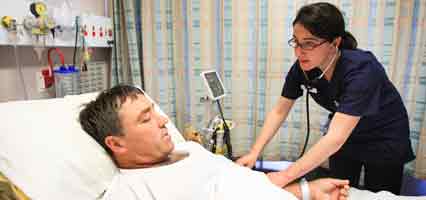
Rheumatology Department
How we can help you
We care for people 16 years of age and over who have problems with their joints, muscles or bones or who have autoimmune conditions. Autoimmune conditions are where your immune system attacks your body's own cells, tissues and organs.
We manage and treat illnesses such as:
- rheumatoid arthritis - painful and inflamed joints
- ankylosing spondylitis - arthritis in the spine
- arthritis related to psoriasis (red scaly patches on your skin), inflammatory bowel disease and infections
- vasculitis - inflamed blood vessels
- gout and pseudogout - red, hot, swollen joints
- osteoarthritis - a breakdown of cartilage inside a joint
- osteoporosis - brittle and fragile bones
- autoimmune connective tissue diseases - Examples are: systemic lupus erythematosus, systemic sclerosis and Sjogren syndrome. These conditions may make people feel generally unwell and can affect many parts of the body including joints, skin, kidneys, eyes, lungs, the heart and the gut.
- inflammatory eye disease
- myositis - inflamed muscles
- autoinflammatory diseases/periodic fever syndromes - Examples are: Familial Mediterranean fever (FMF), VEXAS syndrome, Adult onset Stills disease, Cryopryrin associated periodic syndrome (CAPS), Tumour necrosis factor receptor associated periodic syndrome (TRAPS), and Behcet disease
- general muscle and bone problems
- other rare autoimmune and inflammatory conditions including sarcoidosis, behcet and IgG4-related disease.
Manager
A/Prof Anthony Sammel (Head of Department, Rheumatology)
Learn about our electronic referral system
How to find us
Rheumatology Department
Level 2, High Street Building, Prince of Wales Hospital (building 2B on our campus map).
Rheumatology Clinics
Outpatients B, Level 2, Campus Centre Building, Prince of Wales Hospital (building 16 on our campus map).
Phone: 02 9382 0400
Our team includes five specialist doctors called rheumatologists and one doctor in training. Our rheumatologists are: Dr James Bertouch, Dr Arvin Damodaran, Dr Amel Katrib, A/Prof Anthony Sammel and Dr Hugh Caterson.
We work closely with other medical and surgical services including renal medicine, ophthalmology, dermatology, immunology, respiratory, cardiology, orthopaedic and vascular surgery.
Radiology, nuclear medicine and NSW Health Pathology provide on-site imaging and pathology support for our service.
We work closely with physiotherapy and occupational therapy to provide strengthening and stretching exercises, hand therapy, splints, orthotics and hydrotherapy.
In these clinics, we provide specialist care for all types of rheumatic disease. Some of these are listed above.
| Clinic name | Day of the week | Time |
|---|---|---|
| New patient general rheumatology clinic | Tuesdays | 2.00 pm - 5.00 pm |
| Rheumatology post discharge clinic | Thursdays | 9.00 am - 12 noon |
| General rheumatology clinic | Fridays | 9.00 am - 12 noon |
We are a specialised service and care for people who have vasculitis. Vasculitis describes a group of uncommon diseases which cause inflamed blood vessels such as:
- Giant cell (temporal) arteritis
- Takayasu arteritis
- Polyarteritis nodosa
- ANCA associated vasculitis
- Granulomatosis with polyangiitis (formerly Wegner Granulomatosis)
- Eosinophilic granulomatosis with polyangiitis (formerly Churg Strauss syndrome)
- Microscopic polyangiitis
- IgA / Henoch Schonlein Purpura
- Connective tissue disease vasculitis
- Drug induced vasculitis
- Infective and post-infective vasculitis
- Cryoglobulinaemic vasculitis
- Behcet and autoinflammatory vasculitis
- IgG4 vasculitis
- Cutaneous vasculitis
- Periaortitis / idiopathic retroperitoneal fibrosis
- Cogan Syndrome
- Organ limited (CNS, visceral, isolated aortitis).
We work with other hospital specialists and use the latest technology, emerging treatments and offer access to clinical trials.
| Clinic day | Clinic time | Specialist |
| Tuesdays | 9.00 am - 12.00 noon | A/Prof Anthony Sammel |
We care for patients with systemic autoinflammatory diseases (SAIDs). This rare group of diseases may also be called periodic fever syndromes. They occur when your body’s immune system is activated even when there is no infection. Some SAIDs have underlying genetic causes. SAID symptoms include recurrent and unexplained fevers as well as inflammation and pain in the skin, joints, abdomen, chest and eyes. Conditions include:
-
Familial Mediterranean fever (FMF)
-
Cryopryrin associated periodic syndrome (CAPS)
-
Tumour necrosis factor receptor associated periodic syndrome (TRAPS)
-
VEXAS syndrome
-
Adult onset Stills disease
-
PFAPA (Periodic fever, aphthous stomatitis, pharyngitis, and adenitis)
-
Mevalonate kinase deficiency (MKD)
-
Schnitzler Syndrome
-
Sweet Syndrome
-
Behcet disease
-
Idiopathic recurrent pericarditis
-
Haploinsufficiency of A20 (HA20)
-
Deficiency of ADA2 (DADA2)
-
Blau Syndrome
We work with other hospital specialists and use the latest technology, genetic testing, and emerging treatments to diagnose and manage patients with these conditions.
| Clinic day | Clinic time | Specialist |
| Tuesdays | 9.00 am - 12.00 noon | Dr Hugh Caterson |
You will need a referral letter from your local general practitioner (GP) or specialty doctor to use this service. Your doctor will need to submit this referral electronically via Healthlink. Your referral will include your medical history, relevant test results, X-ray results and what medicines you are currently taking.
Once we receive this referral and accept it we will send you a letter with your appointment details. We will also send this to your doctor. If we cannot make an appointment for you, we will send you a letter confirming that you are on the waiting list for the next available appointment. If you change your address and/or phone number, please call 02 9382 0400.
If you need to change or cancel your appointment or no longer require an appointment/be on the waitlist, please call 02 9382 0400.
Please bring:
- Your referral letter from your GP if it hasn’t already been faxed
- Any blood test results you have relevant to the problem
- Any medical images and reports relevant to the problem
- Your Medicare card
- A list of your medicines or bring all your medicines in a bag, including any herbal or over the counter product
- You are welcome to bring a support person (a relative, friend or carer) with you.
When you come to our hospital for your appointment, you can check-in using our electronic check-in kiosks. These are located in our Adult Outpatient Department, Acute Services Building (Botany Street), High Street and Barker Street entrances.
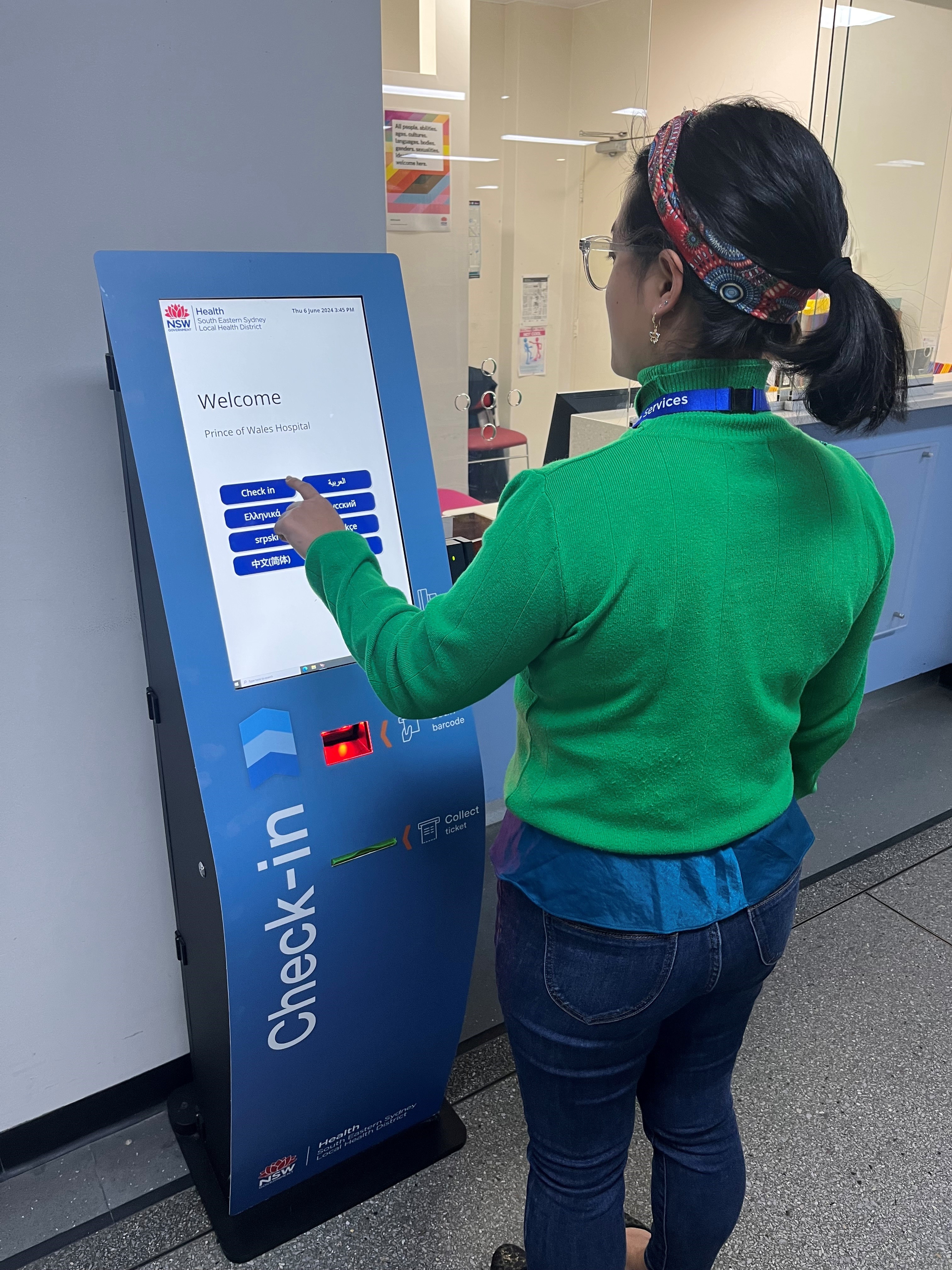
You can find more inforamtion on these trusted websites:
We are teaching hospital and you may be asked to be involved in research or for a student to be present at your appointment. You have a right to say no. If you do so, this will not impact in any way on the services we will provide.
Please let us know if you need an interpreter before your appointment. You can contact us telephoning the Translating and Interpreting Service (TIS) on 131 450. Tell the operator what language you speak and then ask the interpreter to set up a telephone conversation between you, an interpreter, and call our Outpatient Department on 02 9382 0400.
Stroke and TIA Prevention Clinic
How we can help you
We treat and care for people who are at risk of or have had a stroke or Transient Ischaemic Attack (TIA).
A Stroke is a serious medical emergency that occurs when there is a decrease in the blood supply to your brain and seriously affects its function. Urgent medical attention is required to prevent permanent damage or possibly death.
A TIA is when the blood supply to your brain is only temporarily blocked. The signs are the same as a stroke but only last for a few minutes. A TIA is a warning sign that you may have a stroke.
We investigate your risks or causes for a stroke or TIA and make sure that these are managed.
Medical Manager
To make a referral
Visit Information for Health Professionals
Clinic times
Wednesday 1.00 pm to 5.00 pm, excluding public holidays.
How to find us
Level 2, High Street Building, Institute of Neurological Sciences, Prince of Wales Hospital (Building 2 on our campus map)
You will see Professor Kenneth Butcher, our medical specialist, one of our Stroke Nurse Practitioners, or training medical staff. Our doctors will assess, treat and help you manage your risk of stroke or TIA.
Our administration staff will help you make appointments and provide information about what happens at the clinic.
We work in partnership with your local GP, Prince of Wales Hospital and Community Health Services, local pharmacies, and researchers from the University of NSW.
The clinics are held in Neurological Sciences, Level 2, High St Building, Prince of Wales Hospital.
| Clinic | Health professional | Day and time |
|---|---|---|
| Stroke follow up clinic - review of patients who have been discharged from Prince of Wales Hospital | Nurse Practitioner |
Fortnightly Wednesday 1.00 pm - 3.30 pm |
| TIA and stroke prevention clinic | Professor Kenneth Butcher |
Weekly Thursdays 1.00 - 4.30 pm |
| TIA and stroke prevention clinic | Dr Leon Edwards |
Monthly Mondays 1.30 - 4.00 pm |
You can be referred from our Emergency Department, our specialist stroke unit, from your GP or another specialist doctor to use our services. They need to send a referral to Prof Butcher explaining your medical history, relevant test results and what medicines you are taking.
Once we have your referral we will send you your appointment letter in the post. If you provide your phone number you will receive a phone call 2 days before your appointment.
If you need to change or cancel your appointment please telephone the clinic on 9382 2414.
If you are admitted to our specialty stroke unit, you will be given one of these on leaving to wear for 4 weeks.
The HeartBug will monitor your heart rhythm. You will be sent a message when this has been activated so that you can record your symptoms on your mobile phone. We will show you how to use this, but for more information please watch this video.
This can then be returned to us when you come for your appointment in the Stroke and TIA Prevention or Stroke Follow Up clinic.
If you are worried that you, or your family/friend is having a stroke or TIA, dial 000 immediately and ask for an ambulance.
You can find the signs and symptoms for stroke or TIA in this Stroke Foundation information.
If you have other concerns, start by making an appointment with your GP to discuss your health. If your GP needs some advice they can telephone the specialist doctor at the clinic.
Your GP is your primary health care provider and it is important that you continue to visit them. Our specialist doctor will send a letter to your GP after your clinic appointment.
Stroke Unit (Acute)
We have a dedicated ward in our hospital for stroke or TIA patients.
Stroke Follow Up Clinic
If you have had a stroke and been cared for in our Acute Stroke Unit or Rehabilitation ward, you might visit our Follow Up Clinic once you have left hospital. This is run by a specialist nurse and they will check in on your recovery. If you are required to attend this clinic, we will contact you to make an appointment. It is run at the same location and time as the Stroke and TIA Prevention Clinic.
Please let us know if you need an interpreter. You can contact us telephoning the Translating and Interpreting Service (TIS) on 131 450. Tell the operator what language you speak and then ask the interpreter to set up a telephone conversation between you, an interpreter, and the healthcare professional you want to speak with.
We are teaching hospital and you may be asked to be involved in research or for a student to be present at your appointment. You have a right to say no. If you do so, this will not impact in any way on the services we will provide.
Cardiology smartphone application: Monitoring your heart at home
How we can help you
If you have been in our hospital with heart problems, we may offer you a smartphone app to monitor your heart when you go home. We call this remote monitoring.
The app helps to keep track of your blood pressure, heart rate, oxygen levels and weight. Our doctors and nurses review these numbers from the hospital. If there are any early signs of a problem, the app alerts our team and we will contact you.
This service will:
- provide you with quick access to your health care team
- help you learn to manage your heart condition at home
- reduce the need for you to come to hospital in the future.
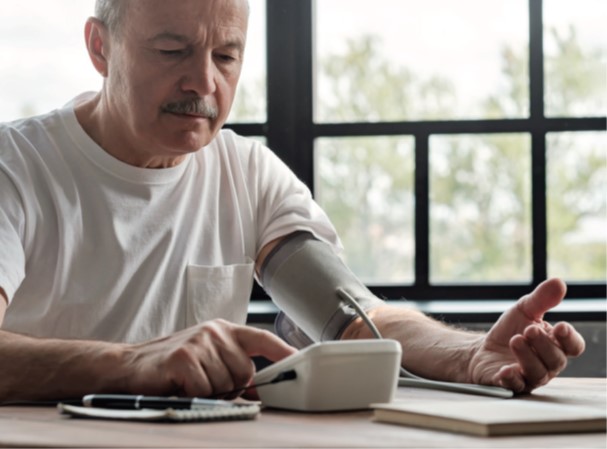
Questions about the equipment or technology?
Call the 1800 number above to reach our Community Management Centre. Opening hours: 8.00 am - 8.00 pm, 7 days a week.
Questions about your cardiac condition?
Contact either your nurse practitioner or cardiologist.
Our nurse practitioners can be contacted on the phone numbers below from 8.00 am - 4.30 pm Monday to Friday.
James McVeigh - Phone: 0421 057 340
Margaret Ryan - Phone: 0499 753 065
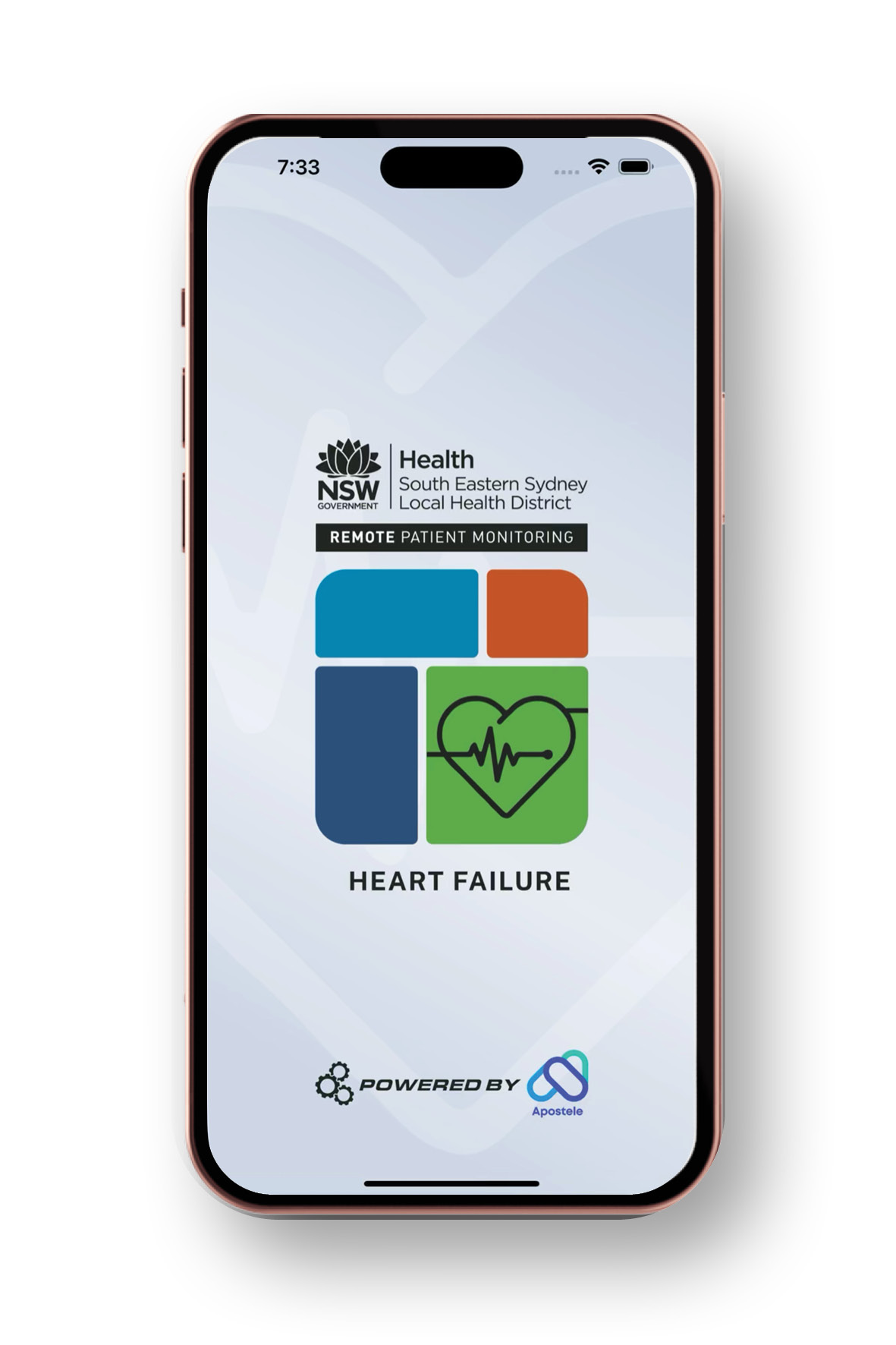
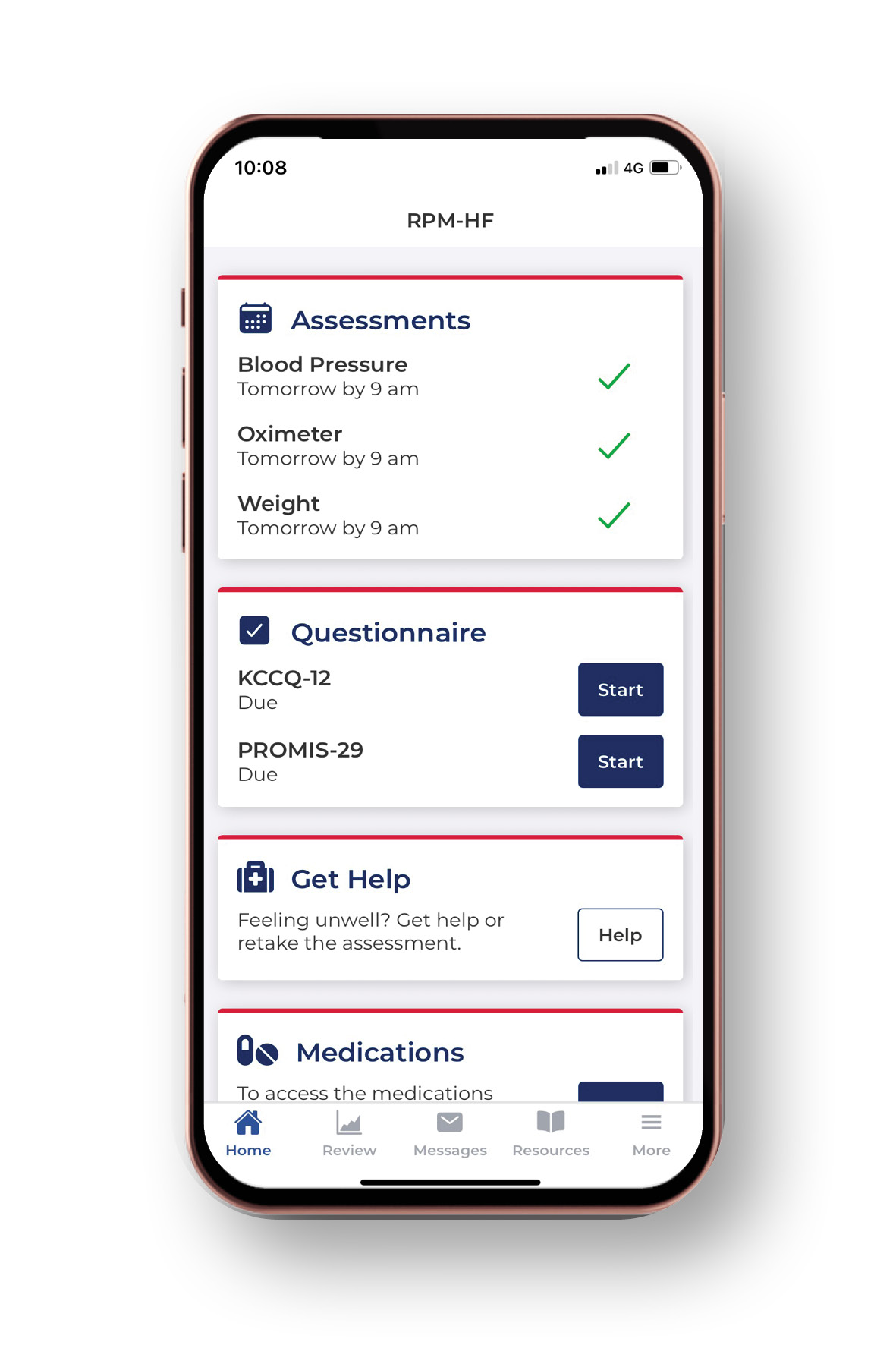 The remote monitoring app is available to all patients who meet certain criteria.
The remote monitoring app is available to all patients who meet certain criteria.
If you meet the criteria, our Community Management Centre staff will contact you. They will loan you equipment including a blood pressure monitor, weighing scales and a pulse oximeter which measures your oxygen level. They will educate you about the equipment and smartphone app and answer your questions.
You can use the remote monitoring service for 6 months. After this, your cardiologist or nurse practitioner will decide with you when you are managing your condition well and no longer need this service.
Cardiology smartphone application: Monitoring your heart at home
How we can help you
If you have been in our hospital with heart problems, we may offer you a smartphone app to monitor your heart when you go home. We call this remote monitoring.
The app helps to keep track of your blood pressure, heart rate, oxygen levels and weight. Our doctors and nurses review these numbers from the hospital. If there are any early signs of a problem, the app alerts our team and we will contact you.
This service will:
- provide you with quick access to your health care team
- help you learn to manage your heart condition at home
- reduce the need for you to come to hospital in the future.

Questions about the equipment or technology?
Call the 1800 number above to reach our Community Management Centre. Opening hours: 8.00 am - 8.00 pm, 7 days a week.
Questions about your cardiac condition?
Contact either your nurse practitioner or cardiologist.
Our nurse practitioners can be contacted on the phone numbers below from 8.00 am - 4.30 pm Monday to Friday.
James McVeigh - Phone: 0421 057 340
Margaret Ryan - Phone: 0499 753 065

 The remote monitoring app is available to all patients who meet certain criteria.
The remote monitoring app is available to all patients who meet certain criteria.
If you meet the criteria, our Community Management Centre staff will contact you. They will loan you equipment including a blood pressure monitor, weighing scales and a pulse oximeter which measures your oxygen level. They will educate you about the equipment and smartphone app and answer your questions.
You can use the remote monitoring service for 6 months. After this, your cardiologist or nurse practitioner will decide with you when you are managing your condition well and no longer need this service.
Spinal Injuries Unit - Outpatient Clinics
How we can help you
We are only one of two units in New South Wales providing care for people with spinal cord injuries. We strive to make sure our patients are empowered to achieve their maximum possible level of independence and quality of life. Our aim is that all patients and their carers feel informed and confident about treatment options and are actively involved in planning their care.
We have an acute inpatient ward and rehabilitation inpatient ward.
After leaving hospital our unit will continue to provide support through your local general practitioner (GP) and through our our outpatient clinics.
We will support you with:
- Respiratory problems
- Bladder and bowel management
- Skin pressure wounds
- Deep vein thrombosis (clots)
- Pain management
- Spasticity
- Changes is sexual function
- Mental health
Our outpatient clinics include:
|
Service |
What we do |
Clinic times |
|
Spinal outpatient clinic/ Telehealth clinic |
Medical review |
|
|
Spinal pressure care clinic |
Multi-disciplinary clinic for patients with pressure areas after spinal cord injury |
Weekly |
|
Spinal multidisciplinary clinic |
Spinal Specialist, Physiotherapist and Occupational Therapist |
Fortnightly |
|
Spasticity clinic |
Spinal Medical Specialist, Physiotherapist and Occupational Therapist |
Weekly |
|
Liaison psychiatry spinal clinic |
Mental health review |
Fortnightly |
|
Pain clinic |
Medical Specialist; and a multidisciplinary team as required |
|
|
Seating Clinic |
Seating Clinic is a joint service between Occupational Therapy & Rehabilitation Engineering. We work with people who are reliant on a wheelchair to determine the most appropriate wheelchair, cushion and backrest for their needs. We provide advice regarding pressure injury management (in relation to wheelchairs and shower commodes) as well as managing postural changes that arise. To access the Seating Clinic, you must be under the care of a POWH clinician. Contact details: SESLHD-RehabEng@health.nsw.gov.au |
Mon - Fri (by appointment) |
Manager
Director Dr Sachin Shetty
Learn about our electronic referral system
How to find us
Dept of Spinal and Rehabilitation Medicine, Level 2, High St building, Prince of Wales Hospital (Building 2 on our campus map)
Some of our clinics are located in our Outpatient Department, Level 2 , Campus Centre, Prince of Wales Hospital (Building 16 on our campus map)
Our team includes:
- Medical staff
- Nursing staff
- Physiotherapists
- Occupational therapists
- Dietician
- Speech Therapists
- Social workers
- Psychologist
- Orthotists
You are the central member of your health care team. We will work together with you to set your individual goals and enable personalised rehabilitation that maximises your potential and transition back to the community.
You will need a referral letter from your local general practitioner (GP) or specialty doctor to use this service. Your doctor will need to submit this referral electronically via Healthlink. Your referral will include your medical history, relevant test results, X-ray results and what medicines you are currently taking.
Once we receive this referral and accept it we will send you a letter with your appointment details. We will also send this to your doctor. If we cannot make an appointment for you, we will send you a letter confirming that you are on the waiting list for the next available appointment. If you change your address and/or phone number, please call 02 9382 5847, 02 9382 5931 or 02 9382 5163.
If you need to change or cancel your appointment or no longer require an appointment/be on the waitlist, please call 002 9382 5847, 02 9382 5931 or 02 9382 5163.
You will need to bring:
- Medicare card
- Health care card and/or concession card (if you have one)
- Previous xrays, scans, ultrasounds or any other test results
- Your regular medicines and a list of all that you are currently taking (or the boxes), including those you take without a prescription such as herbal supplements or vitamins
- Glasses, hearing aid, walking frame.
- Your referral from your GP (local doctor) is essential.
When you come to our hospital for your appointment, you can check-in using our electronic check-in kiosks. These are located in our Adult Outpatient Department, Acute Services Building (Botany Street), High Street and Barker Street entrances.

Please let us know if you need an interpreter before your appointment date. You can contact us telephoning the Translating and Interpreting Service (TIS) on 131 450. Tell the operator what language you speak and then ask the interpreter to set up a telephone conversation between you, an interpreter, and call 02 9382 5847, 02 9382 5931 or 02 9382 5163.
Spinal Injuries Unit - Outpatient Clinics
How we can help you
We are only one of two units in New South Wales providing care for people with spinal cord injuries. We strive to make sure our patients are empowered to achieve their maximum possible level of independence and quality of life. Our aim is that all patients and their carers feel informed and confident about treatment options and are actively involved in planning their care.
We have an acute inpatient ward and rehabilitation inpatient ward.
After leaving hospital our unit will continue to provide support through your local general practitioner (GP) and through our our outpatient clinics.
We will support you with:
- Respiratory problems
- Bladder and bowel management
- Skin pressure wounds
- Deep vein thrombosis (clots)
- Pain management
- Spasticity
- Changes is sexual function
- Mental health
Our outpatient clinics include:
|
Service |
What we do |
Clinic times |
|
Spinal outpatient clinic/ Telehealth clinic |
Medical review |
|
|
Spinal pressure care clinic |
Multi-disciplinary clinic for patients with pressure areas after spinal cord injury |
Weekly |
|
Spinal multidisciplinary clinic |
Spinal Specialist, Physiotherapist and Occupational Therapist |
Fortnightly |
|
Spasticity clinic |
Spinal Medical Specialist, Physiotherapist and Occupational Therapist |
Weekly |
|
Liaison psychiatry spinal clinic |
Mental health review |
Fortnightly |
|
Pain clinic |
Medical Specialist; and a multidisciplinary team as required |
|
|
Seating Clinic |
Seating Clinic is a joint service between Occupational Therapy & Rehabilitation Engineering. We work with people who are reliant on a wheelchair to determine the most appropriate wheelchair, cushion and backrest for their needs. We provide advice regarding pressure injury management (in relation to wheelchairs and shower commodes) as well as managing postural changes that arise. To access the Seating Clinic, you must be under the care of a POWH clinician. Contact details: SESLHD-RehabEng@health.nsw.gov.au |
Mon - Fri (by appointment) |
Manager
Director Dr Sachin Shetty
Learn about our electronic referral system
How to find us
Dept of Spinal and Rehabilitation Medicine, Level 2, High St building, Prince of Wales Hospital (Building 2 on our campus map)
Some of our clinics are located in our Outpatient Department, Level 2 , Campus Centre, Prince of Wales Hospital (Building 16 on our campus map)
Our team includes:
- Medical staff
- Nursing staff
- Physiotherapists
- Occupational therapists
- Dietician
- Speech Therapists
- Social workers
- Psychologist
- Orthotists
You are the central member of your health care team. We will work together with you to set your individual goals and enable personalised rehabilitation that maximises your potential and transition back to the community.
You will need a referral letter from your local general practitioner (GP) or specialty doctor to use this service. Your doctor will need to submit this referral electronically via Healthlink. Your referral will include your medical history, relevant test results, X-ray results and what medicines you are currently taking.
Once we receive this referral and accept it we will send you a letter with your appointment details. We will also send this to your doctor. If we cannot make an appointment for you, we will send you a letter confirming that you are on the waiting list for the next available appointment. If you change your address and/or phone number, please call 02 9382 5847, 02 9382 5931 or 02 9382 5163.
If you need to change or cancel your appointment or no longer require an appointment/be on the waitlist, please call 002 9382 5847, 02 9382 5931 or 02 9382 5163.
You will need to bring:
- Medicare card
- Health care card and/or concession card (if you have one)
- Previous xrays, scans, ultrasounds or any other test results
- Your regular medicines and a list of all that you are currently taking (or the boxes), including those you take without a prescription such as herbal supplements or vitamins
- Glasses, hearing aid, walking frame.
- Your referral from your GP (local doctor) is essential.
When you come to our hospital for your appointment, you can check-in using our electronic check-in kiosks. These are located in our Adult Outpatient Department, Acute Services Building (Botany Street), High Street and Barker Street entrances.

Please let us know if you need an interpreter before your appointment date. You can contact us telephoning the Translating and Interpreting Service (TIS) on 131 450. Tell the operator what language you speak and then ask the interpreter to set up a telephone conversation between you, an interpreter, and call 02 9382 5847, 02 9382 5931 or 02 9382 5163.
Rehabilitation Ward (General Rehabilitation - Parkes 1 West)
How we can help you
If you have had an illness or injury, we will help you set goals and work with you to regain function, independence and wellbeing.
Our therapies include: psychology, hydrotherapy, physiotherapy, occupational therapy, speech pathology, social work, dietetics and podiatry.
Manager
Nursing Unit Manager Melissa Cooper
How to find us
Level 1, Ward West, Parkes Building, High Street entrance, Prince of Wales Hospital (Building 7 on our campus map)
Information about how to get to our Randwick campus
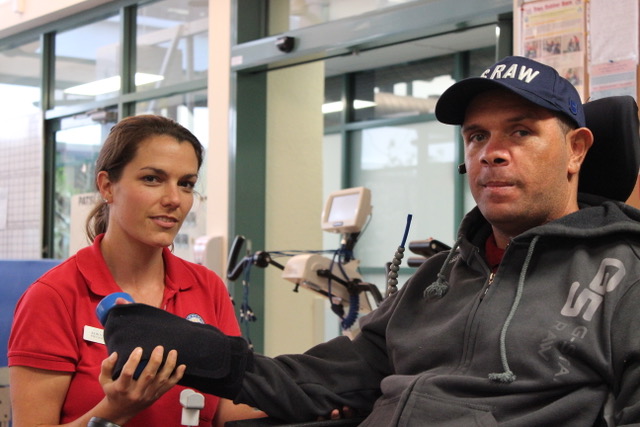
We care for people who want to recover function or independence after a:
- Stroke
- Neurological condition such as cerebral aneurysm, multiple sclerosis, parkinson’s disease, neuropathy or polio
- Arm or leg amputation
- Bone, muscle or joint problem
- Spinal injury
- Period in hospital where they have lost some function or ability.
Our team includes:
- Medical staff
- Nursing staff
- Physiotherapists
- Occupational therapists
- Dietician
- Speech Therapists
- Social workers
- Psychologist
- Orthotists
You are the central member of your rehabilitation team. We will work together with you to set your individual goals and enable personalised rehabilitation that maximises your potential and transition back to the community.
We believe research helps us improve what we do and we test and introduce new, proven techniques. You will sometimes be asked whether you wish to participate in research projects. We will always respect your right to decline if you don’t wish to participate.
We are a teaching hospital and have many team members who are trainees. Interns are newly qualified doctors. The registrar looking after you is in training to become a specialist in rehabilitation medicine. The nursing staff will often include students from our affiliated Universities working under supervision, as do our physiotherapy, occupational therapy, social work, speech pathology and dietician staff. Be assured that they are all well-supervised by fully accredited senior staff members.
Even our experienced permanent staff members are committed to continual education to keep up to date and to learn new ways of working and supporting your recovery.
Please let us know if you need an interpreter. You can contact us telephoning the Translating and Interpreting Service (TIS) on 131 450. Tell the operator what language you speak and then ask the interpreter to set up a telephone conversation between you, an interpreter, and the healthcare professional you want to speak with.
Rehabilitation Ward (General Rehabilitation - Parkes 1 West)
How we can help you
If you have had an illness or injury, we will help you set goals and work with you to regain function, independence and wellbeing.
Our therapies include: psychology, hydrotherapy, physiotherapy, occupational therapy, speech pathology, social work, dietetics and podiatry.
Manager
Nursing Unit Manager Melissa Cooper
How to find us
Level 1, Ward West, Parkes Building, High Street entrance, Prince of Wales Hospital (Building 7 on our campus map)
Information about how to get to our Randwick campus

We care for people who want to recover function or independence after a:
- Stroke
- Neurological condition such as cerebral aneurysm, multiple sclerosis, parkinson’s disease, neuropathy or polio
- Arm or leg amputation
- Bone, muscle or joint problem
- Spinal injury
- Period in hospital where they have lost some function or ability.
Our team includes:
- Medical staff
- Nursing staff
- Physiotherapists
- Occupational therapists
- Dietician
- Speech Therapists
- Social workers
- Psychologist
- Orthotists
You are the central member of your rehabilitation team. We will work together with you to set your individual goals and enable personalised rehabilitation that maximises your potential and transition back to the community.
We believe research helps us improve what we do and we test and introduce new, proven techniques. You will sometimes be asked whether you wish to participate in research projects. We will always respect your right to decline if you don’t wish to participate.
We are a teaching hospital and have many team members who are trainees. Interns are newly qualified doctors. The registrar looking after you is in training to become a specialist in rehabilitation medicine. The nursing staff will often include students from our affiliated Universities working under supervision, as do our physiotherapy, occupational therapy, social work, speech pathology and dietician staff. Be assured that they are all well-supervised by fully accredited senior staff members.
Even our experienced permanent staff members are committed to continual education to keep up to date and to learn new ways of working and supporting your recovery.
Please let us know if you need an interpreter. You can contact us telephoning the Translating and Interpreting Service (TIS) on 131 450. Tell the operator what language you speak and then ask the interpreter to set up a telephone conversation between you, an interpreter, and the healthcare professional you want to speak with.
Pathology (NSW Health Pathology)
How we can help you
Pathology which involves examining your blood, body fluids or tissues to help with making a diagnosis or to review treatments.
Our pathology service is managed by NSW Health Pathology. It is a fully accredited, 'not-for-profit" service providing 24 hour care to all public hospitals in our local area.
Our pathology service can come to your bedside if you are an inpatient and we have a collection centre at our Hospital that you can visit as an outpatient. They can also come to your home.
You require a request form from your local doctor or a specialist to have a pathology test. All results will be provided to the doctor who made the request. Legal requirements prevent us from providing test results directly to patients, their family or carers over the phone.
Visit the NSW Pathology website for more information on costs, booking an outpatient appointment, commonly asked questions and information sheets on how to prepare for a pathology test.
NSW Health Pathology website
https://pathology.health.nsw.gov.au/
Collection Centre Opening Hours
7.30am - 4.30pm Monday to Friday
8.00am - 12.00pm* Saturdays
Closed: Sun & Public Holidays
*No GTT or children under 16 on Saturdays
How to find us
Level 2, Parkes Building, Prince of Wales Hospital (Building 7 on our campus map)
-33.9190596, 151.2393503
Aged Care Rehabilitation Unit
How we can help you
Our team specialises in the care of older people with complex health needs. We focus on rehabilitation after illness or injury and set goals with you and support you in therapies that improve your function and independence. The aim is for you to return your previous level of ability.
We are located on Level 4 South of the Acute Services Building, Prince of Wales Hospital.
Acute Aged Care Extension Unit (AACE)
Also on Level 4 South is our AACE, a six bed unit specialising in care of older patients with behavioural symptoms related to dementia or delirium. The comfort and wellbeing of these patients is enhanced by the quiet environment provided and the staff with specialised skills.
The AACE is arranged like a home with a communal lounge and access to a safe outdoor area. It is a secure unit and you will need to press the buzzer on the wall just before the unit to alert staff that you have arrived.
Manager
Nurse Unit Manager Jane Bayaca
How to find us
Level 4 South, Acute Services Building, Prince of Wales Hospital (Building 30 on our campus map)
Information about how to get to our Randwick campus
Acute Aged Care Extension Unit (AACE)
Phone
02 9382 9493
How to find us
Level 4 South, Acute Services Building, Prince of Wales Hospital (Building 30 on our campus map)
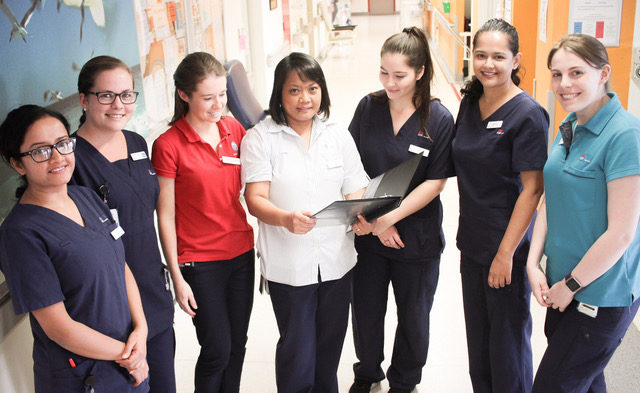
Our team includes doctors, nurses and allied health staff who work together with you, your family and carer to meet your physical, mental and emotional needs while you are in hospital and to begin planning for when you leave hospital.
The aged care wards offer nursing care to patients 24 hours a day, seven days a week. A doctor is always on call. Other members of the team are available from 8am to 5pm, Monday to Friday. Our nurses will try to connect you with other members of staff at your request but, depending on the time and day and the seriousness of the situation, you may have to wait, particularly when it is after hours or on the weekend. We know this can be frustrating, especially if you are worried about your relative, and will do what we can to answer questions in the meantime.
We value your opinions and know that clear communication is essential for your care. If you do not understand anything please ask us:
- Why are you doing that?
- What does that word mean?
- What does that procedure involve?
- What alternatives are there?
- What side-effects might there be?
- How will this help?
When it comes to sharing information with family and friends, it is helpful if one person takes responsibility for asking staff for updates and passing this information on to the others.
What happens if my relative is transferred to another ward in the hospital?
Sometimes, due to bed availability or specific care needs of a patient, patients may be admitted to other wards around the hospital. These patients will still be cared for by the aged care team and will be seen on a regular basis.
We are a teaching hospital and you may be asked to be involved in research or for a student to be present at your appointment. You have a right to say no. If you do so, this will not impact in any way on the services we will provide.
Please let us know if you need an interpreter. You can contact us telephoning the Translating and Interpreting Service (TIS) on 131 450. Tell the operator what language you speak and then ask the interpreter to set up a telephone conversation between you, an interpreter, and the healthcare professional you want to speak with.
www.myagedcare.gov.au is an Australian Government website and national phone line (1800 200 422) with up-to-date information about Australia’s aged care system and services. It assists people to navigate the aged care system and provides referrals for assessment and service provision
The Aged Care Information Line provides information on home and community care and financial benefits. Telephone 1800 500 853 TTY 1800 555 677